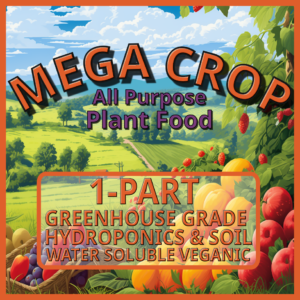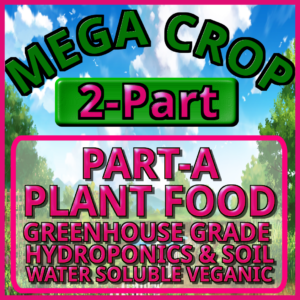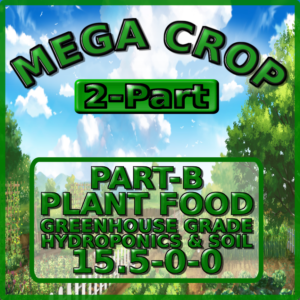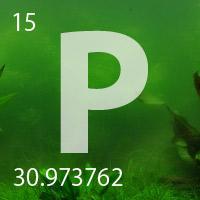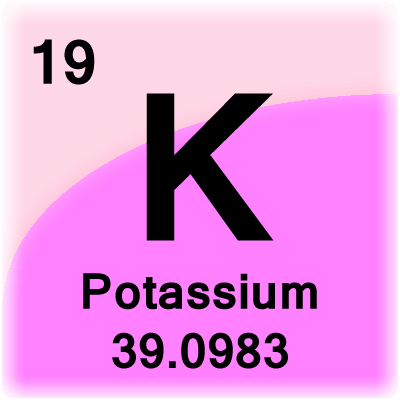Meet The Next Generation Of Plant Nutrients

Nutrient Formula Details
95% Nitrate Nitrogen, 5% Ammonium Nitrogen. Sources: Calcium Nitrate, Potassium Nitrate, Magnesium Nitrate
MEGA CROP uses 19:1 Nitrate to Ammonium, which is optimum amount for hydroponic and soil crops. Keeping the Ammonium Nitrogen source under 5% prevents damage from over-fertilizing.
Nitrogen helps plants grow quickly, while also increasing the production of seed and fruit, and bettering the quality of leaf and forage crops. Nitrogen is also a component of chlorophyll, the substance that gives plants their green color, and also aids in photosynthesis.
Soluble Phosphate Source: Monopotassium Phosphate KH2PO4
Monopotassium Phosphate is the gold standard for hydroponic phosphorous. Phosphorus supports the formation of oils, sugars, and starches. The transformation of solar energy into chemical energy is also aided by phosphorus, as well as is development of the plant, and the ability to withstand stress. Additionally, phosphorus encourages the growth of roots, and promotes blooming.
Soluble Potassium Sources: Monopotassium Phosphate, Potassium Nitrate, Potassium Silicate
Potassium is associated with movement of water, nutrients, and carbohydrates in plant tissue. Potassium is involved with enzyme activation within the plant which affects protein, starch and adenosine triphosphate (ATP) production. The production of (ATP) can regulate the rate of photosynthesis. Potassium also helps to regulate the opening and closing of the stomata which regulates the exchange of water vapor, oxygen, and carbon dioxide.
Although calcium, magnesium and sulfur are considered secondary elements, they are just as important for plant nutrition as any of the other 14 essential plant nutrients.

Calcium is a secondary nutrient that is critical to crop development.
It is needed in large amounts by all plants for the formation of cell walls and cell membranes, and it plays a vital role in soil structure. When calcium is deficient, new tissue such as root tips, young leaves, and shoot tips often exhibit distorted growth from improper cell wall formation. Due to the immobility of calcium in the soil and plant tissues, a continuous supply must be present for plants to access. Calcium is only xylem mobile, meaning it can only move up the plant, and once in place, it cannot be remobilized and moved to new developing tissues. Calcium, along with magnesium and potassium, helps to neutralize organic acids, which form during cell metabolism in plants. It can be found in roots, cell membranes and through the whole plant and it also plays a role in other key plant functions:
- Improves the absorption of other nutrients by roots and their translocation within the plant
- Activates a number of plant growth-regulating enzyme systems
- Helps convert nitrate-nitrogen into forms needed for protein formation
- Is needed for cell wall formation and normal cell division
- Improves disease resistance.
- Helps plants combat heat stress by increasing respiration
- Combat pests and illnesses
Contains 3 different sources of soluble Calcium including Calcium Amino Acid Chelate, ensuring maximum absorption in any condition. This, combined with a whopping 6.5% total content ensures there will be continuous adequate content for the entire life of the plant, even in heavy demanding stages. Calcium content is enough to meet even the most difficult growing mediums such as Coco Coir, which is typically known to leech Calcium from solutions due to the non-existent cation exchange capacity (CEC).
Contains 2 different sources of soluble Magnesium including Magnesium Amino Acid Chelate, ensuring maximum absorption in any condition. Based on scientific analysis and plant tissue data, 2% Magnesium exceeds requirements for all crops, even difficult strains and genetics. Similar to our Calcium, the Magnesium content is enough to meet even the most difficult growing mediums such as Coco Coir, which have very low cation exchange capacity (CEC) and typically need supplements.
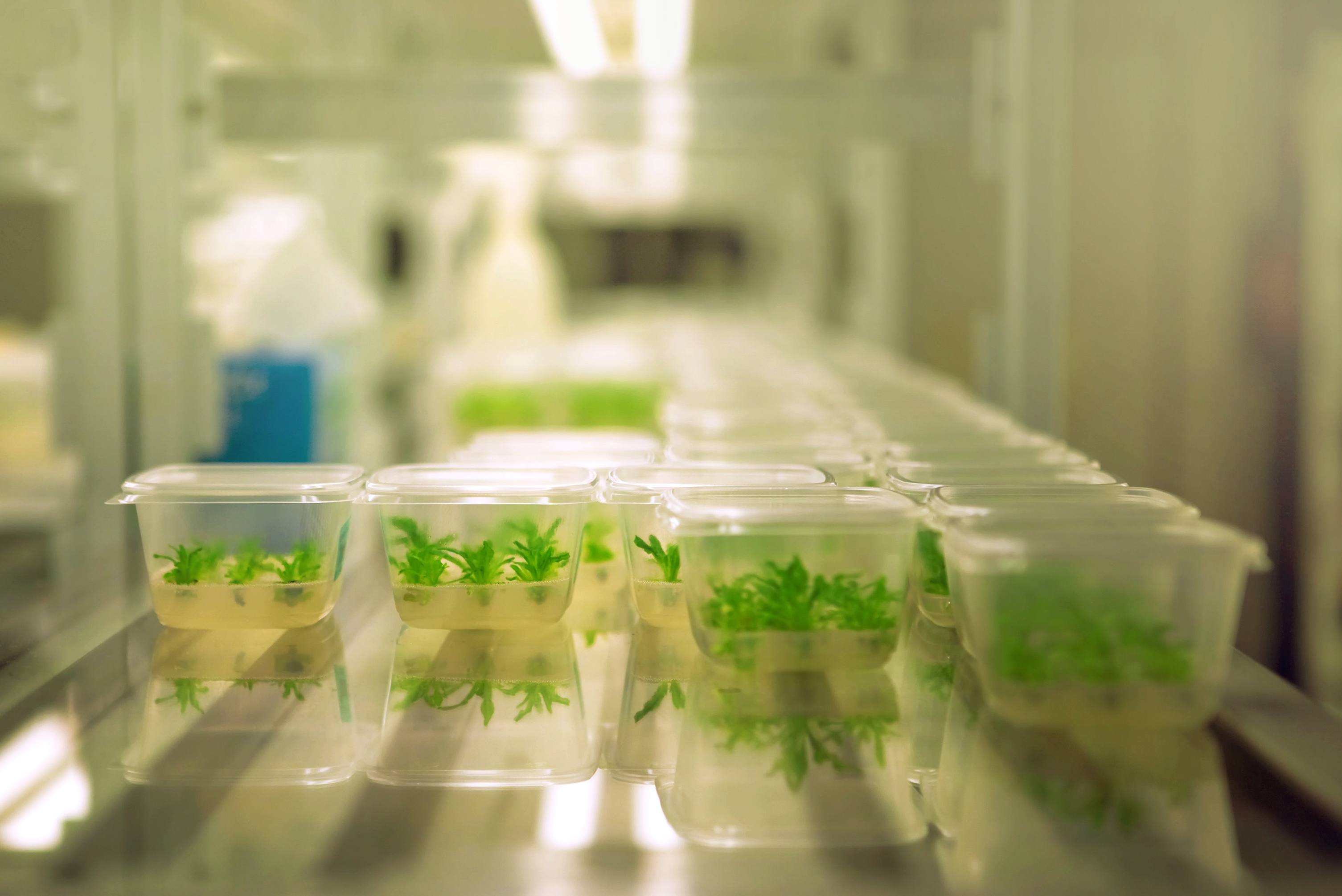
Magnesium is essential for phosphate metabolism, plant respiration and the activation of several enzyme systems.
Energy is required for proper plant growth. Crops require magnesium to capture the sun’s energy for growth and production through photosynthesis. Magnesium is an essential component of the chlorophyll molecule, with each molecule containing 6.7 percent magnesium. It’s the central atom of chlorophyll and has a direct impact on the absorption of solar energy to be subsequently processed and used by the plant in the creation of sugars and carbohydrates. Chlorophyll, the green pigment in plants, is the site where photosynthesis occurs. Without chlorophyll, plants could not manufacture food, and life on Earth would cease to exist.
Magnesium also acts as a phosphorus carrier in plants. It is necessary for cell division and protein formation. Phosphorus uptake could not occur without magnesium, and vice versa. Magnesium also helps to activate specific enzyme systems. Enzymes are complex substances that build, modify, or break down compounds as part of a plant’s normal metabolism.
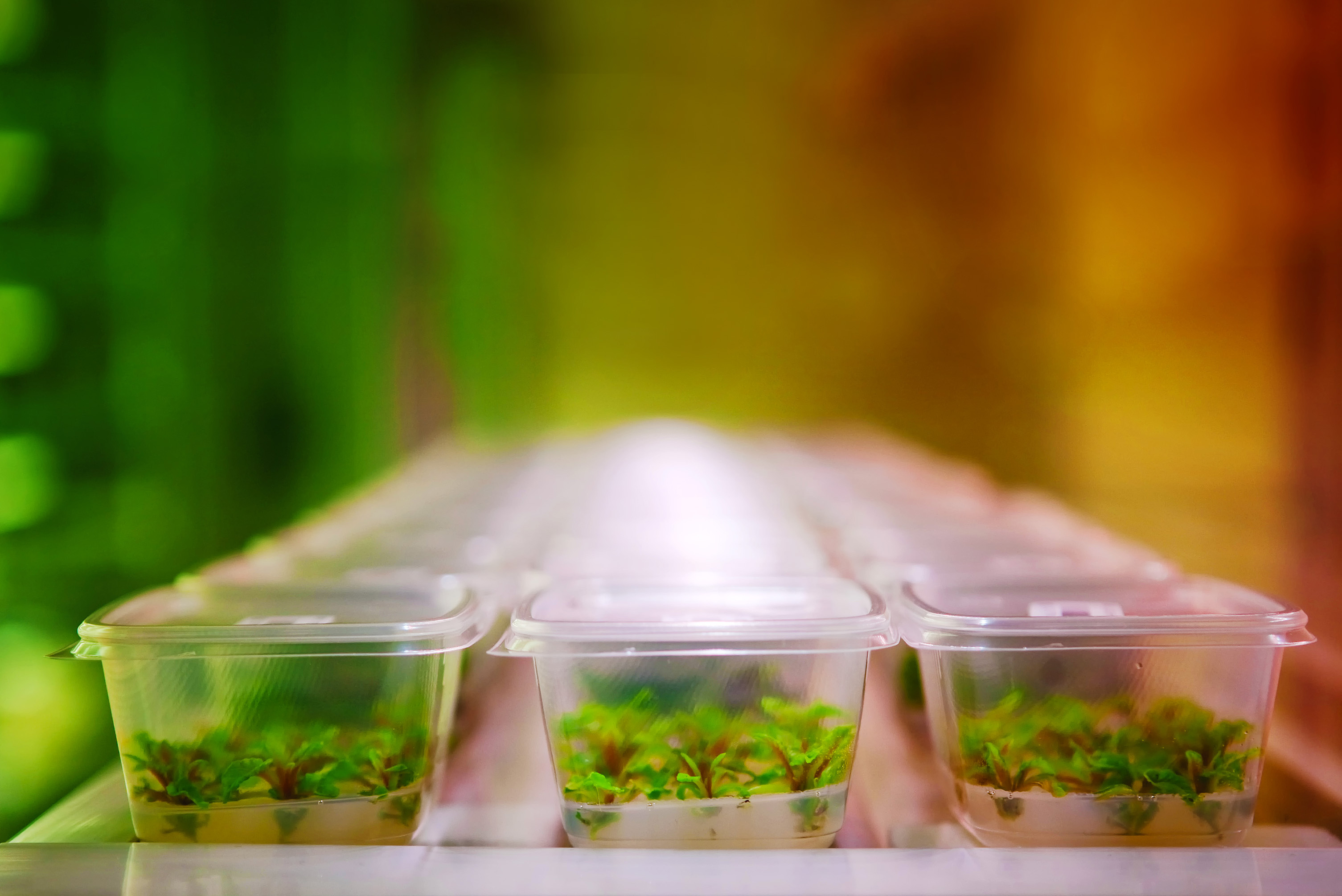
Sulfur is also a secondary nutrient that is necessary for crop development.
Sulfur is part of every living cell and required for synthesis of certain amino acids (cysteine and methionine) and proteins. Sulfur is an essential nutrient in crop production. It is classified as a secondary element, along with Mg and Ca, but it is sometimes called “the 4th major nutrient”. Some crops can take up as much S as P.
Sulfur serves many functions in plants. It is used in the formation of amino acids, proteins, and oils. It is necessary for chlorophyll formation, promotes nodulation in legumes, helps develop and activate certain enzymes and vitamins, and is a structural component of two of the 21 amino acids that form protein. It imparts flavor to many vegetables. It is an important part of plant vitamins, such as biotin and thiamine, which are necessary for normal respiration and metabolism. (Plants synthesize all vitamins they need.) In Cannabis crops, Sulfur has a critical importance in oil and resin as well as terpene production. For maximum potency, resin and smell having adequate Sulfur is critical.
MEGA CROP contains high Sulfur levels, therefore ensuring maximum terpene, resin and essential oil production in flowering. Having a fully water soluble source also ensures quick absorption and efficiency. MEGA CROP uses special chelated sulfur to prevent binding with Calcium. During vegging phase, Sulfur is an essential part of chlorophyll – it can benefit growing leaves, roots and stems.
MEGA CROP uses Organic Amino Acid Chelated trace elements.
Using Amino Acid Chelates such as the ones included in MEGA CROP, however, stops this toxic cycle. The State of Colorado requires all growers licensed under its Amendment 64 system to report every chemical they use on their plants. If you’re buying cannabis in Colorado, therefore, you have the right to ask to see the list of all chemicals used in production, and view if toxic EDTA is listed. Further states are expected to follow also in the future.
Chelation in soil increases nutrient availability to plants. Organic substances in the soil, either applied, or produced by plants or microorganisms, are natural chelating agents. The most important substances having this nature are hydroxamate siderophores, organic acids and amino acids. Hydroxamate siderophores are naturally produced by soil microorganisms and are essential in natural ecosystems to make nutrients soluble and transport them (especially iron and copper) to plant roots.
Amino Acid Chelated trace elements have several performance advantages over EDTA chelation for your plants in growth, and avoid toxic soil conditions and run off.
Increased nutrient availability
Nutrients are already in organic form ready for plant absorption. The organic coating around the chelated nutrients allows it to absorb 20-30x faster and more complete into the plant. Once in the plant, the chelate releases the nutrients by forming metal-organic complexes. Chelation prevents nutrients from reacting with ions (usually in high pH soil) to form insoluble substances. The nutrients are enclosed in organic molecules which protects the plant from precipitation.
Increase nutrient mobility
Chelation increases the mobility of nutrients in soil. It helps large amounts of metal to remain in a mobile form and facilitates movement of the metals to the roots. Chelated nutrients are water soluble for easy application and absorption.
Organic Amino Acid Chelates are biologically active!
Biologically active amino acid chelated fertilizer can stimulate the chemical and enzymatic reactions in plants naturally, since plants natively create amino acids in their normal growth process. So this has the added benefit of stimulating plant growth without adding toxic hormones or synthetic stimulants.
Suppress the growth of plant pathogens
Amino Acid Chelating agents suppress the growth of plant pathogens by depriving iron to pathogens, and favoring plant growth and health.
Amino Acid chelating nutrients is a method which uses amino acid as chelator, forming a stable and highly absorbable and penetrative nutrient
It is a complex and highly stable nutrient, thus preventing metal from bonding with ions or each other resulting in reduced loss of nutrients not available to the plant.
Reduces the negative effects of acidic and alkaline conditions on the metal nutrients (because it forms stable complexes)
It is composed of organic compounds instead of synthetic compounds (such as EDTA, or EDDHA…etc mentioned above). Amino Acid is a more penetrative chelator for metal nutrients in plants compared to EDTA, therefore giving increased performance through better absorption.
Prevents leaching
Metal ions forming chelates are more stable than free ions.
Plants grown with amino acid-chelated supplements are generally richer in sugars and other nutritional elements, and have higher yields
By increasing chlorophyll content and acting as an effective plant growth enhancer, Amino Acid Chelate nutrients act as phytohormones and increase the total output of the plant naturally.
B
Boron
Boron plays a key role in a diverse range of plant functions including cell wall formation and stability, maintenance of structural and functional integrity of biological membranes, movement of sugar or energy into growing parts of plants, and pollination and seed set.
Cu
Copper
Copper activates some enzymes in plants which are involved in lignin synthesis and it is essential in several enzyme systems. It is also required in the process of photosynthesis, is essential in plant respiration and assists in plant metabolism of carbohydrates and proteins. Copper also serves to intensify flavor and color in vegetables and color in flowers.
Fe
Iron
Iron is a constituent of several enzymes and some pigments, and assists in nitrate and sulfate reduction and energy production within the plant. Although iron is not used in the synthesis of chlorophyll (the green pigment in leaves), it is essential for its formation.
Mn
Manganese
Manganese is used in plants as a major contributor to various biological systems including photosynthesis, respiration, and nitrogen assimilation. Manganese is also involved in pollen germination, pollen tube growth, root cell elongation and resistance to root pathogens.
Mo
Molybdenum
Molybdenum is an essential component in two enzymes that convert nitrate into nitrite (a toxic form of nitrogen) and then into ammonia before it is used to synthesize amino acids within the plant. It also needed by symbiotic nitrogen fixing bacteria in legumes to fix atmospheric nitrogen. Plants also use molybdenum to convert inorganic phosphorus into organic forms in the plant.
Zn
Zinc
Zinc activates enzymes that are responsible for the synthesis of certain proteins. It is used in the formation of chlorophyll and some carbohydrates, conversion of starches to sugars and its presence in plant tissue helps the plant to withstand cold temperatures. Zinc is essential in the formation of auxins, which help with growth regulation and stem elongation.
All The Extras
18 L-Grade Amino Acids
L-type amino acids are natively absorbed by the plant, and act as building blocks for proteins and help improve virtually all of the plant functions. Your plant produce these naturally, supplementing with high quality Amino Acids greatly assists your plant in protein synthesis, increases overall performance and can give the following benefits:
Promotes the formation of chlorophyll and photosynthesis – Increases the crop yield – Stimulates and regulates rapid growth of plants – Accelerates nutrient uptake – Enhances the stress tolerance of the crop, and metabolic functions – Enhances root activity and growth – Prevents premature aging – Reduces transpiration, increases drought tolerance – Acts as activators for phytohormones – Acts as effective plant growth enhancer
Cellulase Enzymes
Highly Concentrated Enzyme formulation added to MEGA CROP that assists in breaking down dead roots and organic material. Enzymes are molecules that break down substances into their core building blocks, which then can be reabsorbed by your plants as a highly valuable nutrition source! Enzymes help improve the soil conditions and create an environment that would be found in the healthiest grow conditions. Enzymes also prevent disease and rotting by starving bad bacteria and fungus of their food source of dead plant materials.
Chitosan Oligosaccharide
Chitosan has benefits for agriculture as a fertilizer additive by promoting disease resistance (plant immune regulator) and reducing overall disease from fungus and bacteria. It can also promote growth, increase yields and quality of harvest. Chitosan Oligosaccharide is a high quality processed type of Chitosan, that is much more effective and bio-active compared to normal plain Chitosan.
Ascophyllum Nodosum Kelp Extract
Ascophyllum nodosum is a type of kelp (seaweed) that grows in the ocean. As a fertilizer additive, it has many benefits as it includes 70 different trace elements. It also has vitamins, enzymes, proteins and growth hormones that can all benefit plants. Supplementing can accelerate growth, increase fruiting and flowering and provide resistance to disease and insects. It also has natural auxins, cytokinins and gibberellins which act as natural Plant Growth Regulators (PGR’s).
Soluble Silica
Soluble Silica from Potassium Silicate (K2SiO3) source, easily dissolves in water and can be absorbed by plants directly. Silica can benefit your plant for its entire life cycle, strengthening cell walls, stems and leaves. This increase resistance to insects, disease, drought/heat and overall produces more robust plants. Silica also improves CO2 uptake and nutrient absorption to increase harvests and yields.
B-Vitamins
Adding B-Vitamins as a helper for plants is not a new concept at all, and goes back quite a ways as a “common know how.” Plants create B-Vitamins naturally as part of their growing process, so idea is that supplementing B-Vitamins to the plant can help relieve stress in critical times and improve plant health and growth overall.
MEGA CROP has vitamins B1 (Thiamine), B2 (Riboflavin), B3 (Niacin), B5 (Pantothenic Acid), B6, B7 (Biotin) and B9 (Folic Acid).
Some of the roles of B-Vitamins in the plants are, maintaining healthy DNA and metabolism, creating and using carbohydrates, basic cellular processes, budding and essential oils, enzymatic activity and amino acid synthesis.
Ease Of Use
MEGA CROP was created for simplicity and scaling
01.
Absorption
02.
Simplicity
03.
Fertilizer Injection and Fertigation
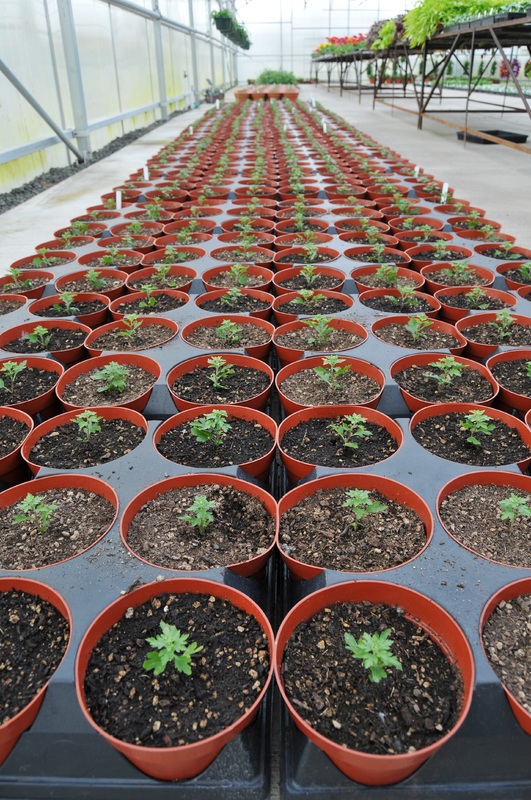
Compatible With All Growing Styles And Media!
Contact
Free Consultation
There is no greater wealth than wisdom, no greater poverty than ignorance; no greater heritage than culture and no greater support than consultation.
[dt_contact_form fields=”name,email,message” message_height=”4″ required=”name,email,message” button_title=”Consult Me!” button_size=”medium”]

